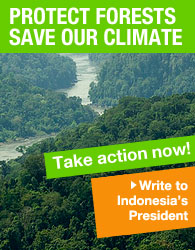About the tour

During October and November 2008, the Greenpeace ship Esperanza will tour Indonesia to tell everyone that protecting our remaining areas of forest is essential if we’re serious about tackling climate change.
Forests are vital to life on earth. They are the richest of all ecosystems – they cover only eight per cent of the planet and yet they are home to two-thirds of all known species of land-based plants and animals. Millions of people also rely directly on forests for their food, water and medicine.
Forests are also important in helping regulate global climate and weather patterns, systems which are critical to support life on Earth. Destroying them releases greenhouse gas emissions which contribute to climate change – about one-fifth of man-made emissions are as a result of deforestation.
Indonesia contains some of the largest and most significant forest areas left on the planet, mainly in the provinces of Papua, Papua Barat and Sumatra. But these forests are under huge pressure, as loggers move into new areas and from the growing threat from the booming palm oil industry.
Indonesia is the largest palm oil producer in the world, and there are plans to expand even further to satisfy global demand as palm oil finds its way into everything from food and cosmetics to detergents and biofuels. The country is also the third largest emitter of greenhouse gases and that’s largely due to deforestation, so protecting Indonesia’s forests is crucial in the fight against climate change.
The crew of the Esperanza will be travelling through the archipelago to reveal the incredible wonders of Indonesia’s majestic forests and peatlands, which will also serve as a reminder of what we stand to lose if the current rates of deforestation continue. We’ll be collecting evidence about the companies who are causing the devastation as they expand their operations – the focus will be on the growth of the palm oil industry, but there are plenty of other factors, including industrial logging and mining. And we’ll also be providing solutions to the crisis both long and short term so these forests can be permanently protected.
Nearly three quarters of Indonesia’s forests have already been lost or degraded, and if we don’t act quickly the rest will soon disappear in a blizzard of chainsaws and blinding smoke. But it’s not too late if we act now.



